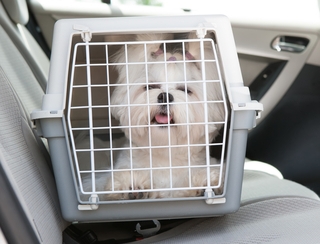Pets And Cars

At some time in their lives many pets will have to travel in a car. For many it is the dreaded and stressful (for owners as well) yearly trip to the vet’s office. For others it is the weekend trip to the camp or lake. While many pets enjoy being away, getting there and back can be fraught with anxiety, motion sickness and vomiting. Many of us take the time and effort to train ours pets (dogs primarily) to sit, shake, roll over and stay, but almost no one takes the time to train their pets to enjoy the car ride. With a small amount of effort this can be done quite easily for a lifetime of pleasant, stress-free travel.
Tips for Success in the Car
- Introduce your dog to the car slowly. Let your dog get in and sit for a few minutes. Reassure him with a few treats and affection, then get out. Repeat this several times until your dog is eager and comfortable getting into the car.
- Once your dog is comfortable, start the engine while he is eating a treat, chewing on a rawhide or playing with a toy. Let the car run for several minutes, then turn off and exit the car. Keep the process quiet and relaxed and be reassuring.
- Finally, start with short 5-10 minute trips. For the first few trips it may be best to have a friend or family member in the backseat of the car to comfort and soothe your dog. Make the first few trips fun by going to a nearby park or walking trail.
Things to Remember
- Remain calm, cheerful and reassuring. Your mood will affect your dog’s response.
- For crate trained dogs, consider using the crate in the car for added safety.
- Small dog car seats or safety harnesses are available and are strongly recommended.
- If you do not have a dog seat or a safety harness, your dog should always be in the back seat where they are safer and cannot distract you while driving.
- Do not feed your dog a meal 2 hours before travel. A full stomach may lead to nausea or vomiting.
- Just like some people, some dogs, especially puppies, are very prone to motion sickness. Many will grow out of it, but if not, consider talking to your veterinarian about medication for motion sickness, such as dimenhydrinate (Dramamine) or meclizine (Dramamine II).
- Always keep a leash on your dog when they are in the car to prevent accidental escape.
- Dogs should not ride in the back of a pickup truck. They should also not be allowed to put their heads out the window because they could injure their eyes or neck.
All of these suggestions apply to cats as well. Cats should always be kept in a carrier when traveling in the car for their safety and yours.
